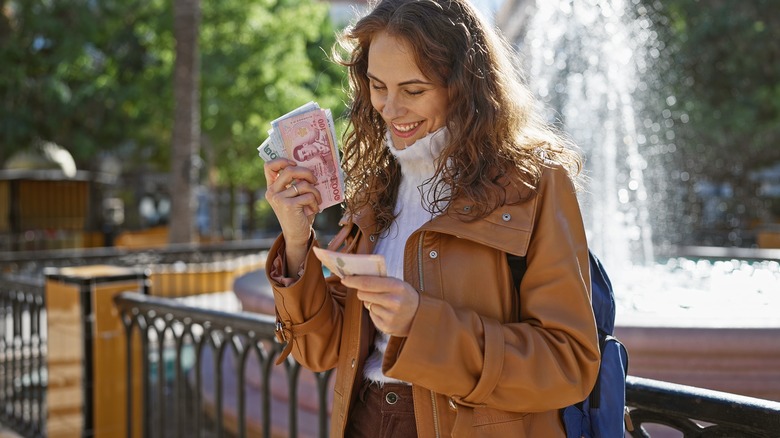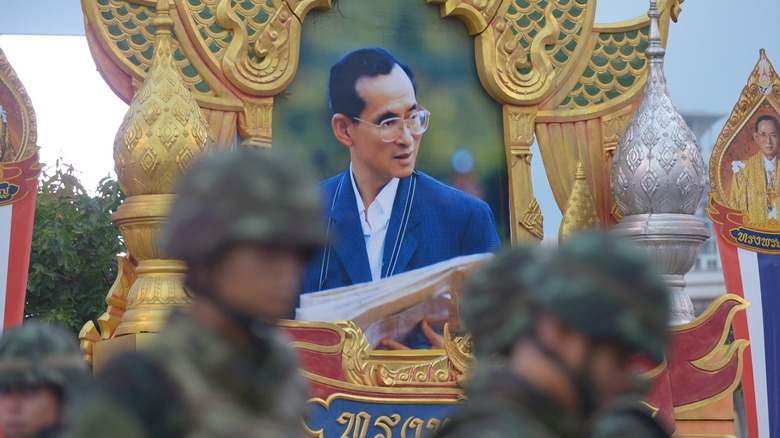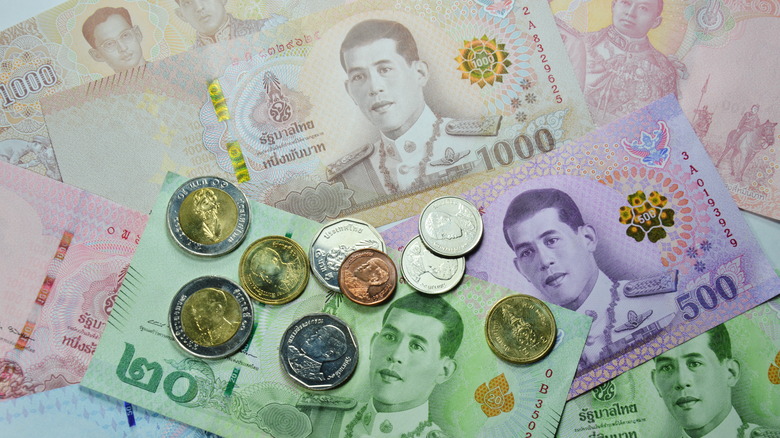Tourists May Not Know This Common Money Practice In The US Is Very Offensive In Thailand
In the United States, handling money is a very mundane, laissez-faire thing — there are no particular rules that delineate how you're supposed to hold, give, or respect those precious dollar bills. When Americans travel abroad, they might bring along cultural practices that are second nature. However, some of these seemingly innocuous actions can actually be deeply offensive in other cultures. If you're headed for Thailand, a bucket list country where the U.S. dollar is strong, do beware. In the "Land of Smiles," a country with a rich cultural heritage and deep-seated traditions, the way you treat the local currency — the Thai baht (abbreviated THB and symbolized by a B or ฿) — can significantly impact how you are perceived.
@zakattackcalii 5 things you should never do in thailand! #bangkok #thailand #thailandtravel #movingabroad
Money in the U.S. is viewed primarily as a tool for transactions. It's common to see people casually tossing bills on a counter or crumpling them into their pockets. These types of behaviors, though perfectly normal in America, are considered disrespectful in Thailand. The reason lies in the cultural significance of the images depicted on Thai banknotes. The back side of THB denominations features cultural sites, historical moments, or national symbols. But, more importantly, the front side has portraits of the current king, King Maha Vajiralongkorn, and his father, the revered King Bhumibol Adulyadej. In Thai culture, the monarchy is honored as a symbol of unity and national pride, and any act that appears to disrespect the royal family is taken very seriously, with strict laws that also apply to tourists.
Thai baht and lèse-majesté laws
King Bhumibol Adulyadej, who ruled for 70 years until his death in 2016 (the third-longest reigning monarch in history), is particularly venerated as an almost god-like figure. His image is omnipresent in Thailand, from giant portraits in public spaces to his likeness on currency. Some establishments even display small denomination banknotes as a token of respect toward the monarchy. There is even a clothing custom of wearing yellow on Mondays in honor of the former king.
However, this veneration of the monarchy also has a dark side, as Thailand has some of the strictest lèse-majesté laws in the world. Section 112 of Thailand's Criminal Code states, "Whoever defames, insults or threatens the King, the Queen, the Heir-apparent or the Regent, shall be punished with imprisonment of three to 15 years." After a 2014 pro-monarchy military coup and the resounding Yellow Shirt royalist movement, matters have only gotten more zealous. However, prison terms for foreigners on the grounds of lèse-majesté are rare.
Consequently, mishandling money is seen as an act of extreme disrespect. Imagine a scenario where a tourist drops a banknote and instinctively uses their foot to stop it from blowing away. Anywhere else, this might be seen as a practical solution, but in Thailand, it's an offensive act. The feet are considered the lowest and dirtiest part of the body, and using them to touch something that bears the king's image is deeply insulting. The Thai baht is, quite literally, king.
Practical tips for tourists in Thailand
With all the laws in mind, the potential for arrest, offense, or any type of legal implication boils down to context. If you dropped a THB bill and accidentally stepped on it, will you get in trouble? No, but it might earn you some dirty looks. If you ostentatiously lay down a Thai baht and begin to stomp on it while uttering slurs about the monarchy in front of a government building or member of the Yellow Shirt movement, will you get in trouble? Yes, most certainly. Ultimately, it's all about intention and context. To avoid inadvertently offending locals, tourists should try to adopt respectful practices when handling Thai currency.
Firstly, always treat banknotes and coins with care. Keep them flat in your wallet — never in your back pocket — and avoid crumbling or defacing them. Don't sit on the banknotes. If you drop money, pick it up only with your hands. When paying for goods or services, hand over the money directly with your right hand, preferably face-up and unfolded. For additional respect, touch your left hand to your right forearm as you present the money. Thailand is a cash society, and although you can pay by card in urban areas, here's why you should always pay in the local currency. Understanding the cultural significance of Thai currency will keep you out of needless legal trouble, help build positive relationships with the locals, and ensure that interactions are smooth and pleasant during your trip.


